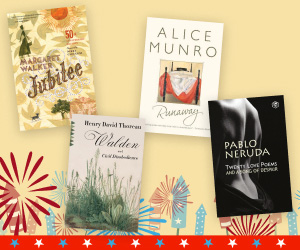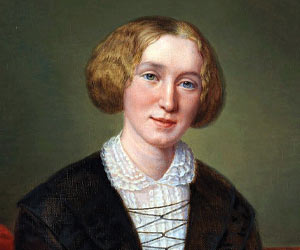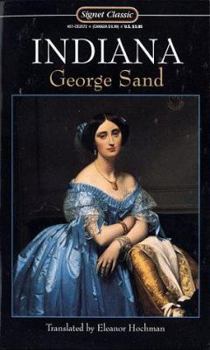Book Overview
The first novel that George Sand wrote without a collaborator, this is not only a vivid romance, but also an impassioned plea for change in the inequitable French marriage laws of the time, and for a new view of women. It tells the story of a beautiful and innocent young woman, married atsixteen to a much older man. She falls in love with her handsome, frivolous neighbor, but discovers too late that his love is quite different from her own. This new translation, the first since 1900, does full justice to the passion and conviction of Sand's writing, and the introduction fullyexplores the response to Sand in her own time as well as contemporary feminist treatments.
Format:Mass Market Paperback
Language:English
ISBN:0451525728
ISBN13:9780451525727
Release Date:May 1993
Publisher:Signet Classics
Length:272 Pages
Weight:0.32 lbs.
Dimensions:0.7" x 4.2" x 6.8"
Related Subjects
Classics Fiction Humanities Literature Literature & Fiction Parenting & RelationshipsCustomer Reviews
5 ratings
Not her best but still good
Published by Thriftbooks.com User , 19 years ago
This is not my favorite of Sand's that I have read to date, I would suggest the Devil's Pool or the Black City first, they are both shorter and much stronger. Not to say this is a bad bit of writing. Considering this is her first solo publishing venture it is very impressive. She still shows flashes of great insight, there are wonderful very quotable lines throughout the work. There are some very stricking scenes, actually the last quarter of the book is pretty riveting. Which is good because the rest of the book is alot of very careful build up and is sort of slow in places. The book is not filled with alot of dialogue, rather we have a third person omniscient narrator who lets us know what the main characters are thinking and feeling (even if they aren't quite sure of it themselves). Indiana is a young bride to an old man who selfishly married her because he wanted someone to take care of him in his old age. She is wasting away from a lack of love, not that Delmare is any sort of ogre really, he seems to devolve slowly into a brute but one Sand never looses complete sympathy for. Sir Ralph is Indiana's cousin and protector, as he has nothing else in the world to live for. Noun is Indiana's Creole servant that essentially is like a sister to Indiana. Noun though is sacraficed to passion as her lover moves onto another target, Indiana. Raymon has taken seducing women very seriously for his adult life, its essentially a game to him. He is very invested in the woman he loves while he loves her but he fully expects his love to end at some point. Which of course it does because he is a cad. There are a few other characters but these are the core of the drama, it is a much smaller cast than in the other full length novel of Sand's that I have read "Horace". I agree with one of the other reviewers that it is very interesting to see that the events of the book are indeed shaped by the events that are happening in France as well. It takes place when there is still a king in power, but the revolution is stirring very vigorously by the end of the novel and informs the actions of a few of the characters. I'm not sure what I thought about the conclusion, it was a little odd as it is told by an unnamed first person character--seemed a little weird, almost as if Sand was trying to make her story have a sort of mythic or legendary tone to it. A good read and not too hard to get into or to follow, possibly good for someone who likes Dickens or Eliot.
One of the largely forgotten great novels
Published by Thriftbooks.com User , 19 years ago
George Sand's Indiana dramatizes and explores a wide variety of concerns in the nineteenth century with a brilliance one rarely finds in a first novel: Arranged marriages, what it means to be a Creole, colonialism and plantation profiteering, slavery, the beginnings of the deterioration of Old Europe, and the rise of the businessman. In terms of narrative style, this may be one of the most unique novels I have read. The use of narrator to facilitate multiple endings is ingenious as well as baffling. Once you get to the end and discover who the narrator is or could be, you will likely want to re-read the novel, and voila! It's like experiencing the novel for the first time. It is a very rare talent indeed to create one novel for a first reading and a second novel for a second reading. It's a mystery to me how Sand has lost much of her notoriety. This novel is far superior than most you will find anywhere and in any language.
Shifting reputation
Published by Thriftbooks.com User , 20 years ago
Remembered mostly as the lover of Chopin and other celebrities of the nineteenth-century art world, Sand seems to be little-read these days. Yet in her day, she was the most respected woman writer in the world. This was her first solo effort. She collaborated on a previous novel, but referred to Indiana as her first. Some of the dialogue is decidedly overheated; real Harlequin Romance, bodice-ripper stuff. The story however, is very strong, with constant surprising twists, right to the end. As usual in melodrama, the villains are more interesting than the heroes, who at times make you want to shake some sense into them. The theme has obvious parallels with Flaubert's "Madame Bovary" and Kate Chopin's "The Awakening". Ironically, the latter author, sharing the name of Sand's most famous lover, is more widely read today. The novel has many references to French social and political life, and more than a few pages which are pure polemic. We learn more about Sand's views on French society than about Indiana's. Some readers will welcome these as fascinating historical insights; others will regard them as annoying distractions. The timeline of the story includes the revolution of 1830 and although this action provides a background rather than taking center stage, it neatly meshes with the mental turmoil of the heroine. The Signet Classic edition has an excellent introduction by Marylon Yalom.
Doll house
Published by Thriftbooks.com User , 21 years ago
George Sand (nee Amantine-Aurore-Lucile Dupin) is the kind of name I've seen in the novels of more famous writers and in the footnotes of those novels, but her own suffer from a lack of visibility on the shelves of libraries and bookstores nowadays. Reading her early novel "Indiana," I see why she was so popular and influential in her era (admirers included George Eliot and Henry James); although she is not the equal of her contemporaries Hugo and Flaubert, her writing has plenty of momentum and is pervaded by an unprecedented psychological awareness that seems well ahead of its time. On the surface, "Indiana" is about loveless marriage, illicit romance, and the violence that results; but the characters are much more compelling and the narrative is more surprising than such a description might imply. Sand's titular heroine, whose unusual name refers not to Hoosier enthusiasm but to her birthplace of a French colonial island in the Indian Ocean, is the nineteen-year-old wife of the wealthy industrialist Colonel Delmare, a crusty, callous retired soldier old enough to be her father, who has a nice country house in Brie. The marriage was arranged, of course, and Indiana is miserable practically to the point of physical illness. That her dog is named Ophelia seems to emphasize the general despair the novel has for the feminine state. There are two other important men in Indiana's life. One is her cousin Sir Ralph, an English baronet, who, trying to overcome a past filled with heartbreak, is protective of her but makes a valiant effort to remain friendly with her imperious husband. The other man is an impetuous Lothario named Raymon de Ramiere who infiltrates the Delmare household by seducing Indiana's beautiful Creole maid Noun and then Indiana herself. Charismatic, accustomed to adoration, Raymon is one of the most histrionic lovers in literature ("If only I could wash away with my blood the shame that I have left on this bed!"), almost comical in the intensity of his passions. Given this woman and the three men who love her, it is clear that jealousy will be the strongest factor in driving the story; but the plot develops in unexpected ways, almost to the extent of a romantic fantasy that defies Sand's supposedly "realist" intentions. However, it is interesting that she allows the various political upheavals of France at the time, coinciding with the burgeoning Industrial Revolution reflected by references to Delmare's factory, to fuel the characters' motivations; they are not just acting in a vacuum that obliviously seals itself from the outside world. Despite its aesthetic qualities, "Indiana" would have problems attracting a modern readership. Sylvia Raphael's English translation, as rich and garish as the icing on a decorated cake, seems naturally to evoke the novel's peculiar tone, that of the kind of antiquated melodrama that a parodist of period romances might try to achieve. And yet, assuming that the novel's style is large
An extraordinary first novel
Published by Thriftbooks.com User , 22 years ago
I recently read a biography of George Sand and it stimulated an interest in reading some of her novels. It wasn't easy to find some, but I did manage to buy 'Indiana' and 'Mauprat' through a second-hand dealer. 'Indiana' is an interesting story of relationships especially between husbands and wives, men and women, nobility and commoners, family and strangers. The central marraige is uncharacteristic of modern Western society in that an older wealthy man has married a young woman for the status of it - he is no more than her friend, and often not even that. But there are many ways in which marraiges can fail either the woman or the man in modern Western society and consequently, for me, the symptoms of what goes on in this novel - even if not the causes - are current in modern society.Sand's story is engaging and generally well paced. It does seem a bit like a soap opera sometimes. It also rushes to an unsatisfactory ending - a bit like the end of 'Well of Loneliness', which appalled me. But then Sand has a surprise for me - although I have a sneaking feeling that it might be an afterthought, a rewrite. What is distinctive about Sand's writing is her ability to create a visionary scene - like the one where Raymon rails against the picture of Indiana's cousin Ralph hanging in Indiana's bedroom (Raymon is there with his lover of the time - Indiana's serving girl Noun). And then there is the extraordinary scene where Indiana almost drowns in the river only to be rescued by Ralph - we see the world transform itself from Indiana's perspective in the most unsettling way. I enjoyed this novel immensely and look forward to reading more of Sand's writing.
Indiana Mentions in Our Blog

Famous Authors Born in July
Published by Ashly Moore Sheldon • July 06, 2025
As we welcome the month ahead, we're shining a light on notable and acclaimed July-born authors. We're delighted to celebrate them and their beloved works of fiction, nonfiction, poetry, theater, and more.

Women Undercover
Published by Ashly Moore Sheldon • November 22, 2019
On this day in 1819, the prominent author Mary Ann Evans was born. But you may not have heard of her because her books were published using the pseudonym George Eliot. And she’s not alone. There’s a long history of famous women writers who adopted male pen names.






